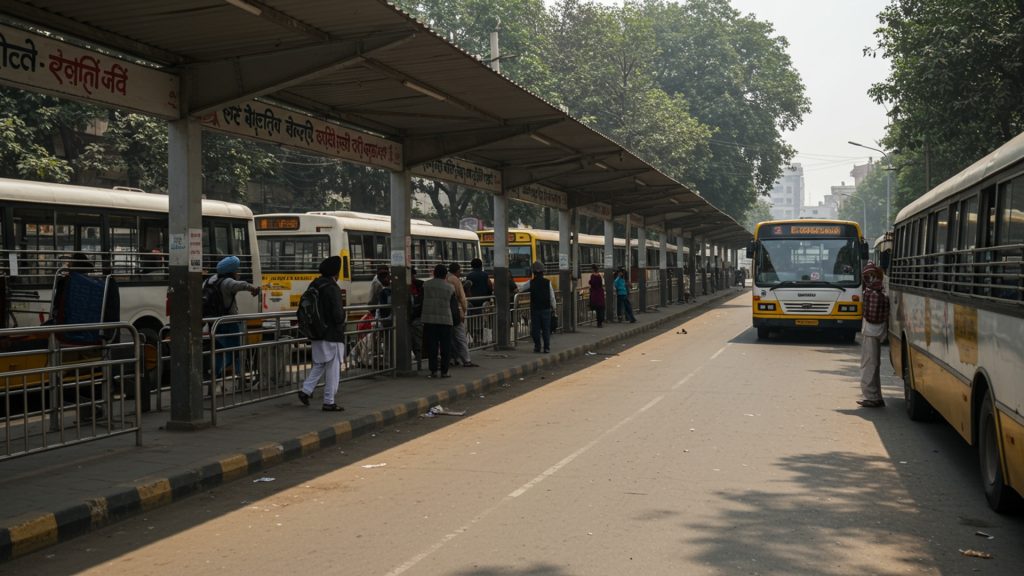Thousands of people in Punjab are stuck today as public bus workers start a big strike, bringing all bus services to a complete stop across the state. The major action, which began this morning, leaves many unable to reach their jobs, schools, or homes, causing widespread trouble. This sudden halt in travel comes after talks between workers and state transport officials failed, with workers demanding better pay. The strike is set to continue, meaning more difficult travel for people in the days ahead.
Thousands of Commuters Stuck
Public bus services across Punjab came to a complete stop this morning, leaving thousands of daily commuters without a way to travel. The major strike by public bus workers began early today, leading to empty bus stands and long lines at other transport options. People trying to reach their workplaces, schools, or hospitals found themselves stranded, causing widespread trouble throughout the state.
The strike, which started at dawn, has affected all routes operated by Punjab Roadways and the Pepsu Road Transport Corporation (PRTC). Buses that usually carry people between cities and towns are parked in depots, with no drivers or conductors on board. This sudden halt in service has hit many hard, especially those who depend on public transport for their everyday travel needs. Major bus terminals in cities like Ludhiana, Amritsar, Jalandhar, Patiala. Bathinda wore a deserted look as the strike took hold. Announcements asking people to make other travel plans were made at some stations. for many, no other affordable choice was available.
Local police and transport officials were seen at various bus stands, trying to manage the crowds and direct people towards private taxis or auto-rickshaws, which quickly became very busy and expensive. Many individuals who travel to work in nearby towns or villages were forced to walk long distances or spend much more money than usual on private transport. The lack of public buses also led to more traffic on roads as more people used personal vehicles, adding to the general confusion and delays experienced by everyone. The suddenness of the strike meant that many people were caught unprepared, leading to significant disruption to their daily routines.
Why Bus Workers Stopped Work
The main reason behind the bus workers’ decision to stop work is their long-standing demands regarding better pay and working conditions. Several unions representing both permanent and contract workers have united for this action. They say that despite repeated requests and discussions with the government, their key issues have not been properly addressed.
The unions’ demands include:
- An increase in their basic monthly pay, which they say has not kept up with rising living costs.
- Better working conditions, including fixed working hours and improved facilities at bus depots.
- The full regularisation of contract workers, meaning these workers would get the same benefits and job security as permanent employees. Many contract workers have been working for years without these benefits.
- Payment of pending dues and allowances that they claim are owed to them.
“We have been asking for fair treatment for a long time,” stated a spokesperson for the Punjab Roadways Workers’ Union. “Our pay is low, our working conditions are difficult. thousands of our contract brothers and sisters deserve to be made permanent. We have no choice but to strike to make our voices heard.”
Another union leader from the PRTC Employees’ Union added that the government had made promises in the past. these promises have not been fully kept. They emphasized that this strike is a last resort after all other attempts to negotiate had failed to bring about the changes they need. The workers believe that their essential service to the public should be met with fair compensation and job security, especially for those working on temporary contracts for many years.
Government Response and Ongoing Talks
Following the major disruption, the state government has quickly stepped in to address the situation. The Transport Minister has called for immediate talks with the protesting unions to find a way to end the strike. Government officials have acknowledged the difficulties faced by commuters and have expressed a desire for a swift resolution.
A meeting between government representatives and union leaders was held earlier today. But, reports from the meeting suggest that a quick agreement was not reached. The main points of disagreement appear to be the financial demands of the workers, particularly the significant cost involved in increasing salaries and making contract workers permanent. The government stated it needs to consider the financial impact of these demands on the state budget.
“We comprehend the concerns of our bus workers. we are committed to finding a fair solution,” said a senior government official after the first round of talks. “But, any decision must be practical and sustainable for the state’s finances. We urge the unions to consider the hardship faced by the public and return to work while discussions continue.”
The government also mentioned that it is exploring temporary measures to help stranded commuters. no large-scale alternative public transport system was immediately put in place. The focus remains on getting the striking workers back on the roads. Further rounds of talks are expected to take place in the coming hours or days, as both sides look for common ground. The government’s aim is to ensure essential services are restored as soon as possible, minimizing the inconvenience to the public.
Commuters Share Their Stories of Trouble
The strike has caused significant trouble for thousands of people across Punjab. Many commuters shared their difficult experiences due to the sudden halt of bus services. Students, office workers, patients. daily wage earners were among those most affected.
For example, a student named Rohan from Bathinda, who was supposed to travel to Ludhiana for an vital exam, found himself stuck. “I woke up early, came to the bus stand. found it empty,” he said. “Now I don’t know how I will reach on time for my exam. This strike has put my future at risk.” His experience was shared by many other students who rely on affordable public transport to get to their colleges or universities in different cities.
A daily wage worker, Sunita, who travels from her village to Jalandhar city every day for work, explained her struggle. “I earn money only if I go to work,” she stated. “Today, there are no buses. I cannot afford a private taxi every day. How will I feed my family?” Her story highlights the severe economic impact on those who live paycheck to paycheck and depend entirely on cheap public transport.
Even medical patients faced difficulties. An elderly woman, Mrs. Kaur, who had an appointment at a hospital in Amritsar, was unable to travel from her village. “I have to go for my regular check-up,” she explained, visibly upset. “There is no bus. My health cannot wait.”
The following table shows an estimate of the daily number of commuters affected by public bus services in Punjab:
| Region | Estimated Daily Commuters Affected |
|---|---|
| Major Cities (Ludhiana, Amritsar, Jalandhar, Patiala) | 250,000 – 300,000 |
| Towns and Rural Areas | 150,000 – 200,000 |
| Total Statewide | 400,000 – 500,000 |
These numbers highlight the large scale of the problem and the urgent need for a solution to restore normal services.
Hopes for a Quick Solution
As the strike continues, the hopes of commuters and authorities alike are focused on a speedy resolution. Both the government and the unions are under pressure to reach an agreement and restart bus services. The economic cost of the strike, not just to the state transport corporations but also to daily businesses and individual livelihoods, is growing with each passing hour.
While the initial talks did not lead to an immediate breakthrough, the fact that both sides are talking offers a glimmer of hope. Public statements from government officials suggest a willingness to negotiate, though they also highlight the financial challenges. The unions, on their part, seem determined to continue their strike until their main demands are met. they also express concern for the public and wish for a fast solution.
Experts believe that a compromise might involve a phased approach to implementing the workers’ demands, or a commitment to future increases in pay and regularization of workers over time, rather than all at once. The duration of the strike will depend heavily on the flexibility shown by both the union leaders and the government representatives in the ongoing discussions. Everyone involved is looking for a way to get the buses back on the roads and ease the difficulties faced by the common people of Punjab.

